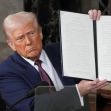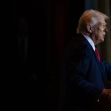Just hours after Donald Trump was sworn into office as the 47th president of the United States, he signed forty-six presidential actions, from building a border wall and reinstating his previous “Remain in Mexico” policy to retaking the Panama Canal and renaming the Gulf of Mexico, just to name a few. In total, President Trump’s new actions on day one include four staffing picks, 26 executive orders, 12 memorandums, and four proclamations.
One of the most momentous orders issued that day is an Executive Order purporting to put an end to birthright citizenship, the law that says anyone born in the United States is a U.S. citizen by virtue of their birth here. The presidential order states that 30 days hence “all federal agencies will be required to confirm the immigration status of the parents before issuing documents like a passport.”
If the order to stop birthright citizenship is not overturned in a legal challenge, a person born on American soil to immigrant parents will not automatically have the legal right to work here; participate in government programs; study on student visas; work for companies using visas; nor be recognized by the U.S. government.
The concept of birthright citizenship is enshrined in the Constitution via the 14th Amendment, which begins, “All persons born or naturalized in the United States, and subject to the jurisdiction thereof, are citizens of the United States and of the State wherein they reside.” Trump’s attempt to end birthright citizenship in his Executive Order rests on defining what it means to be “subject to the jurisdiction” of the United States.
As the President’s order states, citizenship will not be granted to a child born in the U.S. if the “mother was unlawfully present in the United States and the person’s father was not a citizen or a legal permanent resident at the time of said person’s birth.”
Even if the mother’s presence in the U.S. was lawful but temporary, the child will still be denied citizenship if the father was not a citizen or lawful permanent resident (Green Card holder) at the time of the child’s birth.
In a statement by the deputy director of the ACLU’s Immigrants’ Rights Project, Cody Wofsy said that President Trump’s decision to end birthright citizenship was illegal since it is guaranteed by the 14th Amendment of the US Constitution.
“Birthright citizenship is guaranteed in our Constitution and is absolutely central to what America stands for,” Mr.Wofsy stated. “Denying citizenship to babies born on US soil is illegal, profoundly cruel, and contrary to our values as a country.”
In California, Attorney General Rob Bonta agreed, saying that Trump was wrong “by knocking down one of our country’s foundational, longstanding rights and disregarding our nation’s governing document.”
Every president since George Washington has created presidential orders and/or proclamations and sent them to government officials and agencies, in a show of their broad powers. However, courts may step in to halt the orders when states, organizations, or citizens file lawsuits challenging the constitutionality of such actions. Since the landmark 1803 Marbury v. Madison decision, it has been the precinct of the Supreme Court to determine whether a law is Constitutional or not.
The significance of the 14th Amendment is that it advances the national philosophy espoused by Thomas Jefferson in the Declaration of Independence declaration that all men are created equal. After the American Civil War, during a time of great unrest and division, the 14th Amendment enshrined the concept that the country must accept all Americans as citizens, whether they were slaves or children born of parents from another country.
Prior to the 14th Amendment, the Supreme Court in Dred Scott v, Sanford said that African Americans could not be U.S. citizens and ‘had no rights which the white man was bound to respect.” The 14th Amendment handily overturned this decision and defined U.S. citizenship as based on birthright and not a person’s race.
In the 157 years since the 14th Amendment was ratified, numerous Supreme Court decisions have upheld the concept of birthright citizenship. In particular, the Supreme Court in 1898 reached a landmark decision in United States v. Wong Kim Ark that an American-born child of Chinese immigrants was indeed an American citizen.
A report by the Pew Research Center and the Migration Policy Institute found that “about 250,000 babies were born to unauthorized immigrant parents in the United States in 2016…” which is “…a 36% decrease from a peak of about 390,000 in 2007.”
Most legal scholars do not expect the order to end birthright citizenship to survive a legal challenge in the courts. Ending birthright citizenship by a constitutional amendment would face an even greater uphill battle, requiring passage by a two-thirds vote in the House of Representatives and Senate, plus ratification by three-quarters of U.S. states.






